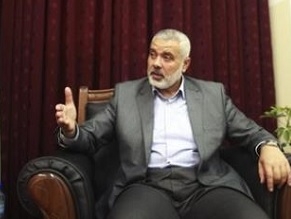|
World Jewish News

Hamas leader Ismail Haniyeh gestures during an interview with Reuters in Gaza City May 10, 2012. Photo: REUTERS
|
Israel focuses on demilitarizing Gaza at Cairo cease-fire talks
05.08.2014, Israel The security cabinet met in a long session Tuesday night to discuss the 72-hour cease-fire that went effect in the morning, as well as Israel's position on the negotiations taking place in Cairo to put together a long-standing arrangement.
The Israeli team that will conduct indirect negotiation through Egypt in Cairo includes Israel Security Agency (Shin Bet) head Yoram Cohen, the Defense Ministry's Amos Gilad, and Prime Minister Binyamin Netanyahu's envoy Yitzhak Molcho.
The cease-fire came into effect at 8:00 A.M. on the 29th day of Operation Protective Edge, and was the first of eight previous cease-fires over this period that was not violated by even a single rocket or mortar fired. Hamas fired a volley of rockets in the direction of Jerusalem just prior to the cease-fire.
While Hamas has a long list of demands of Israel that it is presenting the Egyptians, Israel – according to government officials – is concentrating on two main issues: preventing Hamas from rearming in the short term, and demilitarizing Gaza over the long run.
With the tunnel threat neutralized, and Hamas' rocket capabilities greatly diminished, Israel will insist on a mechanism to ensure that they are unable to rearm themselves as they have done in the past.
One official defined some of Hamas' demands – such as an building an airport and seaport there – as in “outer space.” Regarding their demand that the Hamas prisoners released in the Gilad Schalit deal, and re-arrested last month following the kidnapping and murder of the three Israeli teens, the official said he was not aware that is on the table at all.
Hamas and Islamic Jihad officials from the Gaza traveled to Cairo on Tuesday. The officials – Khalil al-Haya and Emad al-Alami of Hamas and Khaled al-Batsh of Islamic Jihad - traveled through the Rafah border crossing after the Egyptians managed to receive assurances that they would not be targeted by Israel.
The three officials will join the Palestinian delegation that arrived in Cairo earlier this week for discussions with the Egyptians about ways of ending the fighting in the Gaza Strip. The delegation, which is headed by Fatah official Azzam al-Ahmed, consists of senior representatives of Hamas and Islamic Jihad who are based in Qatar andSyria.
Sources close to Hamas claimed that the Egyptians have rejected some of the demands that were presented by the Palestinian delegation a few days ago, including the reopening of the Rafah border crossing and the airport in the southern Gaza Strip, as well as the construction of a seaport.
Former Hamas Prime Minister Ismail Haniyeh said that the Palestinian delegation was sticking to its demands and would not compromise on them.
Haniyeh said in a statement that Israel would not be able to make political gains following its “failure” in the battlefield.
Islamic Jihad’s senior representative, Ziad al-Nakhaleh, announced from Cairo that the issue of disarming the Palestinian groups in the Gaza Strip would not be discussed during the indirect talks with Israel. “This issue is non-negotiable,” he stressed.
He too emphasized that the Palestinian delegation would not make any concessions on its demands, first and foremost the lifting of the blockade of the Gaza Strip.
Channel 2 reported that early on in the campaign the IDF presented the security cabinet with what it estimated would be the cost of a re-conquest of Gaza: hundreds of IDF soldiers killed, a number of others either kidnapped or their bodies held by Hamas, jeopardizing the peace treaties with Egypt and Jordan, thousands of Palestinians killed, and an operation to “cleanse” the Gaza Strip that would take five years.
Meanwhile, Netanyahu issued a statement Tuesday praising the IDF and Israel Security Agency (Shin Bet) for neutralizing the terror tunnels from Gaza, but reiterating that there is no guarantee of 100% success.
“This was a complicated action taken by heroic soldiers under difficult combat conditions,” Netanyahu said.
He said the tunnels' destruction harmed a strategic Hamas weapon in which they invested tremendously over the years. The tunnels would have allowed Hamas to kidnap and murder numerous civilians and IDF soldiers in simultaneous attacks from a number of different tunnels that penetrated into Israel,” he said.
“As I said at the beginning there is no guarantee of 100% success, but we did everything to achieve the maximum,” he said.
Netanyahu sent his condolences to the bereaved families of the fallen soldiers, and said that in his conversations with each family he stressed that their sons fell in the most just battle possible.
By HERB KEINON, KHALED ABU TOAMEH
JPost.com
|
|
